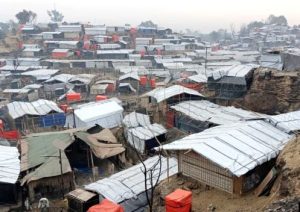Pressure mounting on Rohingya refugees
Rohingya refugees in Bangladesh say they will not return to Myanmar amid fears they will “be confined in camps” in response to moves to encourage their voluntary repatriation.
Their refusal comes as violence against Rohingya refugees by local armed gangs rises and food rations in the camps are repeatedly cut.
Nearly a million Rohingya Muslims are living in camps in the Bangladeshi border district of Cox’s Bazar, most after fleeing a military-led crackdown in Buddhist-majority Myanmar in 2017.
A small group of Rohingya Muslim refugees and Bangladeshi officials recently visited Maungdaw, in Myanmar’s Rakhine State, to inspect arrangements for resettlement.
The Rohingya have expressed discontent with the preparations for repatriation and said they will not go back unless their security can be guaranteed and they can be sure of being granted citizenship.
“We don’t want to be confined in camps. We want to get back our land and we will build our own houses there. We’ll only return with citizenship and all our rights,” a Rohingya spokesman told media.
Myanmar is offering Rohingya national verification cards (NVC), which Rohingya refugees regard as inadequate.
Myanmar’s military had until recently shown little inclination to take back any Rohingya, who have for years been regarded as foreign interlopers in Myanmar and denied citizenship and subjected to abuse.
A Myanmar delegation recently visited the camps in Bangladesh to identify several hundred returnees for a pilot repatriation project.
Bangladesh officials have said the project would involve about 1,100 refugees but no date had been set. Attempts to get Rohingya to return to Myanmar in 2018 and 2019 also failed as the refugees, fearing violence, refused to go back.
Meanwhile, armed groups and criminal gangs are terrorising Rohingya refugees in Bangladesh, and local authorities are doing little to stop it, a new report claims.
The report, by advocacy group Human Rights Watch, documents murder, kidnapping, torture, sexual assault, rape, and forced marriage. 
Many of those killed have been Rohingya community leaders or their family members and scores of refugees have been abducted for ransom and threatened or tortured, the report says.
“Bangladesh authorities are failing to adequately protect Rohingya refugees from surging violence by armed groups and criminal gangs, with layers of barriers to police, legal, and medical assistance,” HRW says.
“Authorities have been forcing Rohingya leaders to serve as informants, putting them at grave risk of being abducted or killed, without access to protection.
“The government should create a rights-respecting security policy in consultation with refugees and the United Nations. Donor governments should press Bangladesh to remove barriers to justice,” it says.
Bangladesh authorities themselves have reported that armed groups killed more than 40 Rohingya refugees in the camps in 2022, while at least 48 refugees were killed in the first half of 2023.
Rohingya community leaders say the totals are much higher. Seven refugees were reported killed in three incidents on July 6 and 7.
Refugees describe an environment of escalating brutality and fear, with growing concerns of being targeted by criminal gangs and claimed affiliates of Islamist armed groups.
“Every night we hear gunshots,” a Rohingya refugee told Human Rights Watch.
“When the shooting starts, we hug each other tightly and wait, fearing it is our turn next,” the refugee said.
In further blow to the Rohingya refugees’ circumstances, food rations in the camps in Bangladesh have been cut yet again.
Rights activists and refugees have voiced concern over the World Food Program’s decision to cut food aid for the second time in three months for more than a million Rohingya.
Because of a fund shortage, the WFP cut its monthly food rations for the Rohingya refugees from $US10 per person to $US8 – amounting to less than nine cents per meal.
The cut follows a previous one in March, when, citing a $US56 million funding black hole, the agency reduced the monthly food aid from $US12 to $US10 per person.
WFP resident representative and country director in Bangladesh Dom Scalpelli told international media that the United Nations food agency was appealing for “urgent support” to be able to “restore rations to the full amount as soon as possible.”
“Anything less than $US12 has dire consequences not only on nutrition for women and children but also protection, safety and security for everyone in the camps,” Mr Scalpelli said in the statement.
Read the Human Rights Watch report here: Bangladesh: Spiraling Violence Against Rohingya Refugees | Human Rights Watch (hrw.org)












